-
Art highlights the elitism of opinionWhen I use 'learn' I generally mean the acquisition of facts, data or something like that. — Isaac
That's a rather narrow perspective on learning though. It's not primarily how you learned your language or how to ride a bike or about the foibles and idiosyncrasies of your family and friends etc. So, I agree it's difficult to quantify what you can learn from a novel or a work of art, but there are different types of knowledge that are more or less easy to make explicit and that ease does not necessarily define their worth. So, if statistics and data are the types of learning you value then yes, why wade through a novel when you can Google these facts or use Wikipedia or a textbook etc? But human nature is something you've been learning through observation since early childhood and good novels can provide virtual scenarios that are realistic and engaging enough to allow you to learn about social interaction and human psychology in a similar way to how you "naturally" learn it in everyday life—without having to be explicitly aware of exactly what you learned. In other words, you might not be able to put the new knowledge into words, but your character alters in such a way that you behave differently. And the behavioural change is the test of useful knowledge having been acquired.
Mybe my fusty academic outlook, but I'm not seeing what there is left to 'learn' from, say Richard III, that a good psychology textbook and a History of England can't tell you better. — Isaac
Here is maybe where it comes down to taste. There are people who are not very academic who would prefer to learn about history or psychology through a play rather than a textbook. And what they lose in accuracy they may make up for in depth. Again, it's fine to have a bunch of accurate statistics running about in your head, but without the question, what are they for? being answered, there is no way to measure whether that knowledge is of greater worth than whatever less explicit knowledge is gleaned through an alternative source, which may have a more direct (and positive) use/effect.
And these kinds of learning don't have to be in competition. The philosopher John Searle probably has more explicit knowledge filling up his head than the vast majority of us, but he says he learned most of what he knows about human nature from Dostoevsky. Go figure... -
Emphatic abstractions
Well, 'my reality' vs 'your reality' would be more of a psychological difference than a metaphysical one. There's an issue of mixing discourses. Context is key, of course. If you can really justify a distinction, go ahead and make it. -
Emphatic abstractions
I think the point is that if your only purpose is emphasis and there's no clear distinction to be made in context then the addition of the adjective to the concept is at best superfluous. Which is OK in everyday conversation i.e. "This steak is absolute perfection", but a symptom of muddled thinking in philosophical discourse.
And your examples don't really match up with un's. -
Emphatic abstractions
Numerous historical reports of adjective-hybrid usage by folks with PhDs and other such absolute amaziball credentials makes their legitimacy unquestionable in a truly* meaningful way. Should you have doubts, I have pictures I photoshopped myself on a website I produced while smoking some stonkingly* super Afghan.
*Excuse the adverbs—poetic licence. -
Why do you use this forum?
I already spend too much time here, so I think I'll give Hanover's Moonshine Mountain a miss. But I'll send you some fresh banjo strings or something as a token of my affection. -
Art highlights the elitism of opinion@Isaac
Let's not criticize art for not being what it's not supposed to be. Fiction is called fiction to distinguish it from fact. Novels ought to be read with that in mind, and Dickens is not responsible for anyone making historical claims of accuracy re his works. So, yes, if you want unbiased, factually accurate and corroborated representations of reality, go for a history book by a reputable scholar and not Oliver Twist, that's obvious. But that doesn't imply that you can't learn something from Oliver Twist or any other novel. You just need to judge it by different standards. -
Individualization and Socialization
The two are intertwined. The individual is social and society is composed of individuals. So, individualization is a process whereby the socialized individual develops his or her character in a way that defines them apart from other individuals in the social context. And socialization is, in a broad sense, the production of individuals as persons in the first place. It begins more or less from birth. So, there's always some degree of individualization and some degree of socialization, and it's not a zero sum game either.
But your question is not very clear. Are you confused about the concepts or looking for advice on how to apply them to your own life? Or what? -
Top Hybridization-Geneticist suggests we're a Pig-Chimp Hybrid.
If you want a community where people are judged on their credentials rather than their arguments, you're in the wrong place anyway. Whatever credentials we happen to have or not to have don't in themselves make us better or worse posters or mods. Good luck. -
Art highlights the elitism of opinion@ZhouBoTong
You wrote a bit too much to reply to it all, but on these central points.
1) Am I claiming that everyone who doesn't appreciate art is a moron?
No, I never said anything like that. There are different ways to be smart. Some very smart people probably don't appreciate art.
2) Is art just entertainment?
No, art is supposed to convey emotions and/or ideas of significant value. Entertainment need not do that. So, the two are different even though they may overlap in some instances. You can refuse to recognize the difference if you want but there's nothing particularly "elitist" in it—it's generally accepted even by those who are not into art. -
Why do you use this forum?
I come here mainly to read the thoughts of PhD hybridization-geneticists such as @Hanover.
...I've always liked the crowd at the old forum as well as here. Feels like the local bar minus the sports conversations. -
Art highlights the elitism of opinion
Well, if you had valid reasons for your opinion and could point to evidence for it, you should have been given credit for that. So, maybe it was bad pedagogy. Certainly, the last thing a teacher should be doing is stifling original thought. Of course, just because something is original doesn't mean it involves thought either. -
Art highlights the elitism of opinionI agree, we are definitely forced to agree with the supposedly 'intelligent' opinions of those in the arts. Shakespeare, Da Vinci, Michelangelo, etc. — OpinionsMatter
I don't think we are forced to agree. There are reasons why certain artists are considered more important than others, and the reasons have to do primarily, as @Brett pointed out, with what they offer us of value in terms of insights into human nature, truth, reality etc. And that's not just asserted, but explored and justified in depth in literature and other humanities courses. Nothing wrong with disagreeing. It's just that disagreement on the merits of the greats isn't going to carry much weight unless a consensus develops around it. And there needs to be reasons for that development. But it does happen and things do move on. We're not stuck with classical art, for example—there are multiple other respected options.
Of course, it's unlikely Michael Bay will ever be one of them, but I doubt that matters to him because he's not trying to do art, he's trying to make money. And that claim, or at least the claim that his movies are garbage, can be rationally argued on the basis of a number of criteria including characterization, plot, use of language, imagery, quality of acting, etc. etc. In other words, we're talking of opinions, but not just opinions. Some opinions matter more than others because they're supported better. -
Art highlights the elitism of opinion@ZhouBoTong
Here's someone justifying why Transformers (and Michael Bay) is crap.
And here's someone justifying why Shakespeare isn't:
Lots of justifications for both opinions in there. Have at them! -
Art highlights the elitism of opinionI do feel comfortable enough in my knowledge of education or the arts to justify any insults - for example: Shakespeare is OK at best (brilliant use of language but garbage stories). — ZhouBoTong
OK, what is the justification then? Why is Hamlet, for example, a garbage story compared to, say, the story of Transformers or whatever? -
Cancel my TPF membership. I've no use for content-moderation based on unqualified personal opinion.
We'll give you 24 hours and then if you still want to, we'll delete your membership. Have a think about it. -
Abuse of moderaton-privilege--removal of a thread from a category
As it happens, I have a degree (Zoology) in the field in question. And with regard to your earlier complaints about me correcting your language, I have a degree in that too and have taught at universities up to Master's level in the field. Not that, as @fdrake mentioned, any of those qualifications would be necessary to delete pseudoscience or correct your egregious mistakes, and not that your complaints are anything more than silly appeals to authority.
You can take your foot out of your mouth now. -
Abuse of moderaton-privilege--removal of a thread from a category
In future, your pseudoscience will be instantly deleted. And no apologies will be made for keeping this site clear of it.
With respect, this is just one of those rare occasions where you happen to be wrong. -
Introduction
You can start a topic on the general issue and take a position for debate, but you can't post your paper for feedback. -
Top Hybridization-Geneticist suggests we're a Pig-Chimp Hybrid.
He specifically uses the reports (which obviously he didn't write—he wasn't alive) as evidence for the notion that chickens and humans interbred, and he is endorsing that notion whether or not he definitively endorses the evidence.
From the first page "The Hühnermensch":
"Why would such hybrids occasionally occur?... So it seems that it is not that distant hybrids are entirely impossible, but rather that they do occur, but with hybrids that reach advanced stages of development being produced at only at very low frequencies."
"This page quotes three separate reports about living creatures that may have been human-chicken hybrids. Two of them are from scholarly sources."
And the pig-chimpanzee thing is hardly less insane though it's a little more subtle. -
Top Hybridization-Geneticist suggests we're a Pig-Chimp Hybrid.As to why McCarthy decided to troll, BS, self-promote his way to Daily Mail stardom, the answer is most likely the usual one:
"Donate
Support Macroevolution.net!
Wondering how much to give? The usual donation is about $10, but please simply give only as much as you can easily afford. (Obviously, larger contributions will do more to keep the good ship Macroevolution.net afloat!)
To make your donation with a credit or debit card—or with your Paypal account—through a secure donation page on PayPal, please click here:" -
Top Hybridization-Geneticist suggests we're a Pig-Chimp Hybrid.http://www.macroevolution.net/human-chicken-hybrids-fischer.html
"This page quotes three separate reports about living creatures that may have been human-chicken hybrids. Two of them are from scholarly sources. The first of these reports gives a description of a hen with a human face. A translation of the original Russian report, it appeared in the October 1816 issue of the scholarly journal Annals of Philosophy (vol. 8, no. iv, pp. 241-247). The author of the article was Johann Gotthelf Fischer von Waldheim, the well-known German-born Russian naturalist."
"During the course of his work as director of the museum, he received specimens from all parts of Russia. One year, he was sent a very exceptional living specimen, a chicken with a human face, which he formally described. A transcript of his description, in English translation, appears below, together with illustrations of the animal that accompanied the article. The illustrations were prepared by one of the university’s artists, a Mr. Valesicon. They show three views of the face of the creature (which didn’t differ from ordinary chickens with respect to other portions of its body). A footnote on the first page of this article states it was “Translated almost verbatim from the Russ[ian] with some additions from the German edition by Dr. Lyall, Physician to Count Orlof at Moscow.”
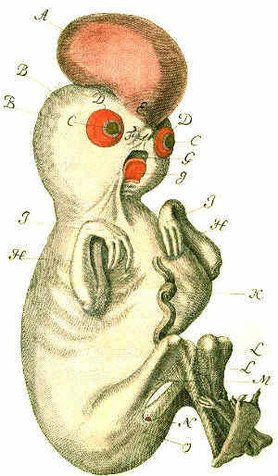
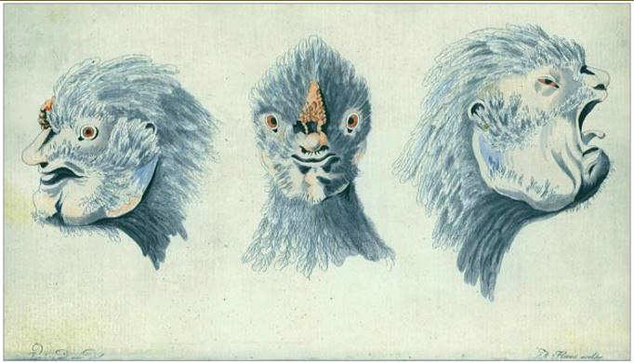
"Also fascinating is a related case, which appears at the bottom of another page on this website as a screenshot of a news story. It describes what may have been an extremely bizarre human-cat-chicken three-way hybrid, a veritable sphinx in modern times." Learn more >>

-
Top Hybridization-Geneticist suggests we're a Pig-Chimp Hybrid.
You don't need a PhD in genetics to know how silly this idea is. But as it happens, I do have a background in this field, i.e. a degree in Zoology. (Not that you'd need one of those either, just as you wouldn't need to be a historian to know that Charlie Chaplin didn't lead the Third Reich into WWII). Anyway, persist if you must. It's in the lounge now. -
Top Hybridization-Geneticist suggests we're a Pig-Chimp Hybrid.And McCarthy's counterweight to claiming something that is scientifically impossible is cherry-picked morphological similarities and historical "evidence" such as this:
"An alleged pig-human hybrid that, according Johann Georg Schenck, was born on Cyprus near Nicosia, on Dec. 12, 1568, along with four normal piglets. (source: Monstrorum historia memorabilis, 1609, p. 113, fig. 85). The structure shown on the forehead may represent a frontal proboscis."
"Moritzburg. The German historian Johann Christoph von Dreyhaupt, in his treatise on his native Halle (Beschreibung des Saalkreises, 1755, vol. I, p. 645), states that a piglet with a human head was born in that city in 1523)."

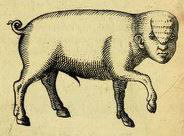
http://www.macroevolution.net/pig-primate-hybrids-old-accounts.html -
Top Hybridization-Geneticist suggests we're a Pig-Chimp Hybrid.
The idea is so ridiculous and so wrong in so many ways, and insultingly wrong to anyone with any background or understanding of the field, it's almost not worth explaining to anyone who takes it seriously. It's like asking someone with a good knowledge of history to prove WWII actually happened. But anyhow, seeing as you seem to give it credence, (on what basis I don't know) here is some of the basic detail of why it's wrong:
"As anyone who remembers the early days of molecular phylogeny knows, one of the oldest techniques for telling how closely related two animals are is to attempt to hybridize their DNA. Human and chimp DNA hybridizes easily in a test tube, since it’s roughly 98% the same. Other primates don’t hybridize as well, since they share fewer common alleles with us. Long ago, the early DNA hybridization studies showed that pigs and primates have very few alleles in common, about the same as primates share with any other distantly related order of placental mammals. As both P.Z. Myers and “Artiofab” pointed out in recent blogs, however, there are huge problems hybridizing pigs and chimps. Pigs have 38 chromosomes, chimps have 48. You simply can’t have a fertile hybrid with this many mismatched chromosomes. Even human/chimp hybrids are impossible for the same reason, because we have different numbers of chromosomes. And huge sections of chimp and pig DNA are radically different, so even if he did manage to separate the strands in a lab and hybridize them, they would not continue to develop. Then there’s the problem with the sperm of pigs even recognizing the ovum of a chimp, since the eggs have their own protein coats that are specific to their species, and prevent insemination from alien sperm. In addition, there’s the problem with immunological rejection: any tissue that is foreign to us is attacked by antibodies before it can get very far. This is why transplants of organs between species is very difficult. (Immune rejection is the reason for the failure of creationist Leonard Bailey’s unethical experiment in replacing the defective heart of “Baby Fae” with a baboon heart, rather than a heart from a more closely related organism like a chimp). The pig’s sperm would be wiped out by a big immune reaction, just like any other invading virus or bacterium or foreign body. ...
Pigs and chimps (and humans) are separated by at least 70-80 m.y. of evolutionary divergence into lineages which have long gone different directions—hybridization between such long-evolving groups simply doesn’t happen.
These genetic and anatomical differences are so difficult to overcome precisely because both lineages have been separated since the early radiation of the placental mammals, probably in the latest Cretaceous 70-80 m.y. ago, when dinosaurs still roamed the planet. The two groups diverged long ago and have been evolving separately since then, so there’s no way lineages from these two very different parts of the placental family tree can ever hybridize. Again, the long list of mistakes he makes in citing shared plesiomorphic characters shows that this guy is not up to date on phylogenetic thinking. (Even more bizarre: he thinks platypuses are crosses between birds and mammals, even though those two lineages have diverged 300 m.y. ago).
There’s no point in beating this ridiculous scientific argument to death any further. But this raises the next question: who is this Eugene McCarthy, and how did he go off the deep end of crackpot science?"
https://www.skepticblog.org/2013/12/04/hogwash/
Etc etc
If you're still not convinced, try to examine and understand the diagrams below.
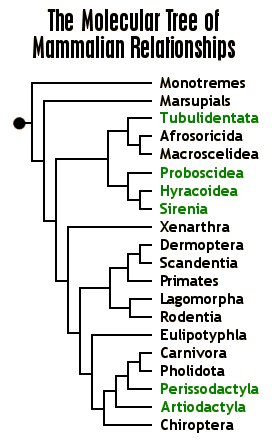
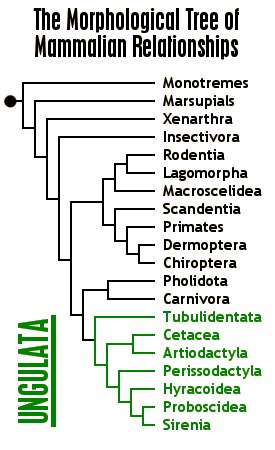
-
Top Hybridization-Geneticist suggests we're a Pig-Chimp Hybrid.http://americanloons.blogspot.com/2018/02/1958-eugene-m-mccarthy.html?m=1
"Eugene M. McCarthy (no known relation) is a pseudo-evolutionary crackpot biologist famous for his completely ridiculous crackpot idea that “humans evolved after a female chimpanzee mated with a pig”
...
"More recently, McCarthy has expanded on his hypothesis and claimed that humans have hybridized with chickens*, dogs, apes, goats, cows, and turtles. His “evidence” is based on mythological accounts (satyrs are evidence of goat-human hybrids, for instance), and imaginative interpretations of stories of women who had grossly deformed stillborn babies with peculiarly warped features.
Diagnosis: Another fine example of pure pseudoscience: Formulate a hypothesis that superficially fits certain pieces of data you’d like to fit together, ignore the vast amount of contradicting evidence, never test it, and maintain it with dogmatic rigor no matter what falsifying evidence might come your way. One might be inclined to believe that McCarthy is also completely harmless, but his work – given the media exposure – has been actively used to try to undermine the legitimacy of real science, so whatever influence he has is certainly not benign."
* http://www.macroevolution.net/human-chicken-hybrids.html
Edit: I see @frank posted this link already. -
Top Hybridization-Geneticist suggests we're a Pig-Chimp Hybrid.Charitably assuming this is a joke and moving to the lounge.
-
Too stupid for philosophy.
You might be being a bit hard on yourself. A genuine interest in philosophy and a reasonable level of competence in postings is all that's required to get along here. Then again, if some of the difficulties of thinking philosophically are turning you off, there may be better ways to focus your time. Don't beat yourself up anyhow. You're always welcome here. -
Morality
I'll get back to the rest of your earlier post later (after you answer whether you are going to persist in the mistake of insisting that language use such as "pain is popular" is apt. We won't even be able to communicate if that's how you insist on speaking). -
Morality
When you use inapt / imprecise language you can infect your claim with meanings unintended, which was the point I intended to make and which you've proven rather comically with your claim that "pain is popular". In any case, I've tried to make things clear enough by elaborating:
Classifying as an argumentum ad populum the claim that that appeal to a broad level of intersubjectivity is evidential re morality by playing with the word 'prevalent' and turning it into 'popular', which has different implications, misses the mark. For example, that pain is generally felt as a bad thing is evidential of the general truth of the moral precept 'We ought not to inflict unnecessary pain', and that can't be effectively challenged by claiming we're only appealing to what people popularly believe concerning the feeling of pain (as if there was some kind of free choice involved). No. Pain in itself, its nature, its prevalence, and its effects, not popular notions concerning it, is what's morally salient here and moving away from that is misleading. At the very best, inapt. Which was the specific charge made, and that I'm supporting. — Baden
So that's it in detail. -
Morality
Here's another one. 'Heavy' and 'massive' are synonyms, but saying 'the rain is 'massive' today' rather than 'the rain is 'heavy' today' would be inapt. -
MoralityYes. — Terrapin Station
It doesn't matter if there's one sense that overlaps. Your language use is inapt. Do you know what I mean by 'inapt'? Check out the whole area of collocations concerning the apt use of language. For example, 'exhibit' and 'display' are synonyms when talking about something in a museum, but not when talking about computer screens. My computer screen is a 'display', but it would be inapt to call it an 'exhibit'.
Is my computer screen an exhibit? -
MoralitySome sort of language expert you are when you're not even familiar with ""frequently encountered or widely accepted" as a definition of "popular." — Terrapin Station
For example, that pain is generally felt as a bad thing is evidential of the general truth of the moral precept 'We ought not to inflict unnecessary pain', and that can't be effectively challenged by claiming we're only appealing to what people popularly believe* concerning the feeling of pain (as if there was some kind of free choice involved). No. Pain in itself, its nature, its prevalence, and its effects, not popular notions concerning it, is what's morally salient here and moving away from that is misleading. At the very best, inapt. Which was the specific charge made, and that I'm supporting. — Baden
*"Popularly believe" means "widely accepted". I've covered that. But you saying that pain is "popular" because it is "frequently encountered" will rightly result in people laughing in your face, and your language will be inapt. Do you get it yet? -
Morality
Nice attempt to shift the goalposts from the original point in question, i.e. the inaptness of the term 'popular' as opposed to 'prevalent' in context and the difference in senses between the two words. @Janus originally used the term 'all but universal' and you switched that to 'popular' so you could use the argumentum ad populum to undermine his position. But that doesn't work because you misrepresent what he was saying by using an inapt synonym. 'Prevalence' and 'universality' share the meaning he intended whereas 'popular' muddies the waters. Deliberately.
So, I'll explain again in more detail, not so much for you, but for those actually interested in having a real conversation on the issue: What people tend to feel and do in terms of interpersonal behaviour cross-culturally, what's prevalent taking a holistic view, is constitutive of what's moral because it reflects commmonalities in the human condition unbeholden to the local, i.e. it's an appeal to the broadest level of intersubjectivity. Classifying as an argumentum ad populum the claim that that appeal to a broad level of intersubjectivity is evidential re morality by playing with the word 'prevalent' and turning it into 'popular', which has different implications, misses the mark. For example, that pain is generally felt as a bad thing is evidential of the general truth of the moral precept 'We ought not to inflict unnecessary pain', and that can't be effectively challenged by claiming we're only appealing to what people popularly believe concerning the feeling of pain (as if there was some kind of free choice involved). No. Pain in itself, its nature, its prevalence, and its effects, not popular notions concerning it, is what's morally salient here and moving away from that is misleading. Or at the very best, inapt. Which was the specific charge made, and that I'm supporting.
But then this type of wordplay is probably the only slim chance you have of getting any mileage of your utterly confused and self-contradictory position re morality where you've stated yourself you recognize pain and harm as salient, but only when it's inflicted physically, refuse to acknowledge all sense of degree re other forms of pain, refuse to offer any justification and then immunize yourself against any possibility of a rational challenge by claiming there's no recourse to reason possible and the only justification for moral claims is what we feel about them. Now that sequence of silliness is worthy of a lol. In short, you have zero of sense to offer on the subject and when that's pointed out you retreat into the usual nonsense, 'it's just an opinion' etc. That is literally all you've got. -
Gobbledygook Writing & Effective Writingwhat is the most effective way to write possible? — Joseph Walsh
Read lots of good clear writing. You'll likely end up absorbing a lot of the positives of the style. -
Gobbledygook Writing & Effective WritingWhat are some examples of famous philosophers with gobbledygook writing? — Joseph Walsh
Hegel. But he did it like a pro. Derrida has been accused of same. -
Morality
To refer to commonalities in morality as 'popular' rather than 'prevalent' suggests a relatively irrelevant meta-level of judgement of judgements. Morality consists primarily in how people's judgements are borne out in action not how much people like or admire those judgements. Ergo, referring to moralities as 'popular' rather than 'prevalent' is imprecise and inapt as Janus pointed out.
E.g. we don't say that in modern society the prohibition of rape is 'popular', we say that the prohibition of rape is 'prevalent'. -
MoralityThe difference between prevalence and popularity is? — Terrapin Station
The way you constantly misunderstand English is irritating. Look up a dictionary on this too and if you still can't figure it out, I'll tell you. But make an effort.
Baden

Start FollowingSend a Message
- Other sites we like
- Social media
- Terms of Service
- Sign In
- Created with PlushForums
- © 2026 The Philosophy Forum






